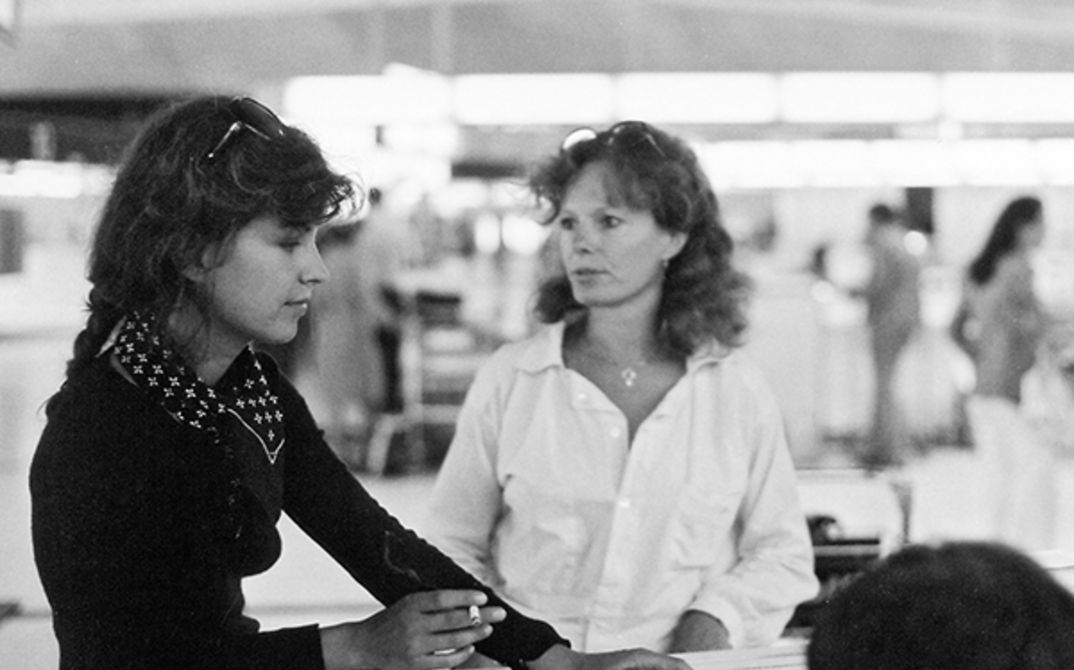Film, video, and feminism
DELPHINE ET CAROLE, INSOUMUSES documents the encounter between and the feminist engagement of the French actress Delphine Seyrig and Swiss video pioneer Carole Roussopoulos. Through the portrait of these two fearless accomplices, and of their subversive, militant use of video and cinema, the film also depicts the ‘enchanted’ feminist period of the 1970s, which was marked by biting humour and creative energy.
The film is anchored in a historical and a personal context, which offered me the opportunity to engage with my grandmother Carole Roussopoulos’s work and vision. Her last project, which she worked on until shortly before her death in 2009, became the film’s starting point. She had started an archive-based documentary film about her friend and feminist ally Delphine Seyrig. In her notes, Carole describes her urgent wish to pay tribute to this disobedient muse, to honour and celebrate her feminist engagement and her achievements as an actress.
I was immediately inspired by her vision and I decided to take over the project together with Alexandra Roussopoulos and Géronimo Roussopoulos. Remaining faithful to Carole’s humanist motto – giving voice to those who have been silenced and letting people speak for themselves – I decided to only use archival material: photographs, interviews, and excerpts from their films and videos. Delphine and Carole should tell their own stories.
I discovered a fascinating 12-hour-long interview, conducted by Hélène Fleckinger in 2007 and 2008, in which Carole talks about her work as a filmmaker, the feminist movement and her dear friend Delphine. I felt compelled to include Carole’s powerful presence and voice in the film.
Their first encounter
Delphine and Carole first met in Paris in 1974. Carole, who was already politically engaged at the time, purchased the second video camera that arrived on the French market in 1969 (Godard allegedly bought the first one), and used it to document the struggles of the lesbian and gay movement (the F.H.A.R.) and of the Black Panther Party. In 1970, she founded the first militant video collective in France, Video Out.
Delphine Seyrig’s ambivalence towards her acting profession – her understanding of gendered, stereotypical roles, and of the power wielded by directors and producers – led her to the studio where Carole gave video workshops to a group of women. There, Delphine discovered the subversive potential of the medium of video.
When Delphine Seyrig knocked at her door, Carole did not recognise the famous actress. After the workshop, they became friends and started working together on various films, including MASO ET MISO VONT EN BATEAU(1976) and S.C.U.M. MANIFESTO (1976). They co-founded the feminist video collective Insoumuses (a neologism that merges the French words for ‘insubordinate’ and ‘muse’). In 1982, together with Ioana Wieder, they also founded the Centre audiovisuel Simone de Beauvoir, the first archive of audiovisual works by and about women.
A new unencumbered medium
With DELPHINE ET CAROLE, INSOUMUSES, I want to give an account of two women’s striking trajectories in the fields of video and cinema, and of their encounter within the context of the enchanted feminist decade that lasted from the beginning of the 1970s until 1982. The film also sheds light on the emergence of video as a creative and emancipatory tool, as a new and unencumbered medium available to women.
I also wanted to pay tribute to the encounter between these two women. Their collaboration, meetings and communication became important stimuli for initiating change and questioning the existing order of things. Their films and actions are proof that humour can be a weapon for the mass destruction of patriarchy!
I was inspired by their conception of feminism – a kind of ‘fairynism’ – and this conception should also emerge from the film, because it relates to joie de vivre, because it blurs the boundary between the political and the private, and because it rejects victimhood. Carole said that she did not want to divide her life into ‘slices of salami,’ that work, activism and friendship belong together and complement one another.
Since DELPHINE ET CAROLE, INSOUMUSES is entirely made up of archival material, while making the film, my primary preoccupation was weaving together and connecting the women’s images and voices. Editing the film was a challenge and my collaboration with Josiane Zardoya was invaluable. I tried to convey Delphine and Carole’s biting sense of humour and their irreverence by juxtaposing various kinds of images, which I drew from excerpts of their video productions, from films featuring Delphine Seyrig as an actress, from interviews with both women, and from photographs. Cinema, video and feminism thereby inform and echo one another.
There are striking parallels between the feminist struggles of the 1970s that I depict in the film and the struggles of today’s women, be it with regards to the stereotypical roles attached to women and to actresses in particular (which expose inherent sexism and racism as if through a magnifying glass), to the power relations within the workplace and the private sphere, or to reproductive rights as well as lesbian and sex workers’ rights.
I believe that Delphine and Carole’s contagious, creative energy can be a source of strength for us. Their type of political engagement and the joyful radicalism that they embody is more important than ever, especially at a time when so many are dismissed as ‘feminist killjoys’.
Preserving the memory of Delphine and Carole does not only contribute to the record of a history written from the perspective of women, but also gifts us with information and energy from which to draw understanding and confidence. (Callisto Mc Nulty)
